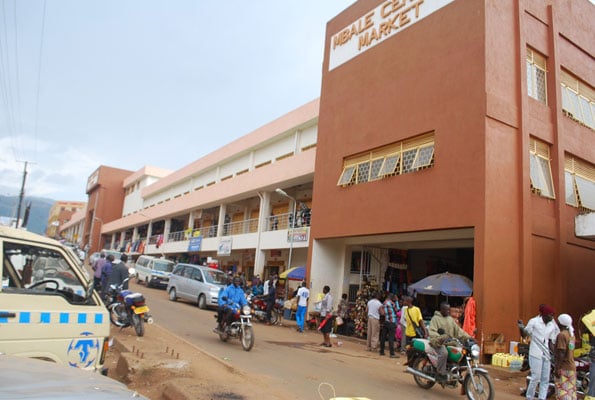
Ministry of Local Government officials during a verification of stalls and lock-ups in Mbale Central Market in June 2024. PHOTO/YAHUDU KITUNZI
More than half of stalls and lock-ups in Mbale Central Market were allocated to rich people and Mbale City officials contrary to the guidelines, Daily Monitor has learnt.
Mbale Central market, which was commissioned in April 2014 by President Museveni, is one of the 19 markets established in Uganda under the Markets and Agriculture Trade Improvement Programme (MATIP) with funding from the African Development Bank (ADB) and the Government of Uganda.
The intended beneficiaries were the urban poor to empower them to improve their incomes to fight poverty.
However, Mr Geoffrey JJ Ettedu, the assistant commissioner in the Ministry of Local Government, said 80 percent of stalls and lock-ups in Mbale Central Market are allocated to the rich people and some officials working with Mbale City Council.
“The rich people have gone ahead to rent at exorbitant fees the stalls and lock-ups that were allocated to them by the council officials to the poor, contrary to the actual fee set by the government,” Mr Ettedu said last Friday.
In April, the Ministry of Local Government directed a fresh verification exercise of all central market vendors in the country.
This came after President Museveni tasked Local Government minister Raphel Magyezi to carry out investigations into market ownership and produce a report.
Mr Ettedu said the members of the allocation committee and council officials in Mbale City were part of the group that allocated themselves multiple lockups for rent collection.
“We have taken decisive action to reclaim Mbale Central Market from self-proclaimed landlords exploiting vendors. The self-proclaimed landlords disregarded governmental regulations, imposing exorbitant rents on vendors,” he said.
He said they have formed a joint operation involving the Ministry of Local Government, State House, Police, and Mbale City Council aimed at handing back stalls and lockups to the intended vendors in the market.
“The move is aimed at reinstating the market’s original purpose of fostering trade and bolstering traders’ livelihoods as envisaged in the Markets and Agricultural Trade Improvement Programme (MATIP),” he said.
According to Mr Ettedu, the Market Act, 2023, states very clearly that a vendor making a living in the market is the one supposed to be operating from there and the landlord is the city council.
Ms Grace Nafuna, a vendor said the situation had reached alarming levels. “There was gross corruption through extortion and bribery during the allocation process,” she said.
Mr Zakariah Mudebo Nangoli, the chairperson of produce dealers in Mbale Central Market, echoed the vendors’ frustrations.
“We were about to demonstrate because the landlords have served us notices of rent increment,” he said.
Two people were last month arrested for allegedly illegally owning 20 lock-ups and renting them out to vulnerable vendors.
Mr Arthur Mukisa, a technical assistant from the Office of the Vice President, said during lockup and stall allocation in Mbale and other newly constructed markets across the country, there were many irregularities whereby authorities favoured rich people.
“The government built these facilities to help its poor people to come out of poverty and increase government tax collection,” he said.
Monitor understands that the Ministry of Local Government has so far re-allocated about 500 lock-ups in Mbale Central Market, collecting Shs120 million in the exercise that lasted one week.
However, Mr James Kutosi, the senior communication officer for Mbale City Council, said some of the dissatisfied owners of the stalls and lockups have gone to court to challenge the ongoing exercise directed by the President.
“Some landlords went to court to get an injunction. The matter is coming up next week,” Mr Kutosi said.
Background
In 2021, former Minister of State for Economic Monitoring in the Office of the President Peter Ogwang ordered a forensic audit into the management of local revenue sources in Mbale Central Market.
The minister was shocked when the city authorities told him that they collected Shs1 million every year from Mbale Central Market, the biggest market in Bugisu Sub-region.






